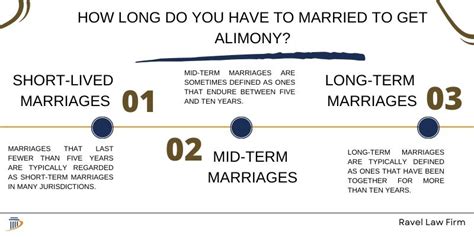Decoding Alimony: Marriage Duration's Influence
Alimony, also known as spousal support, is a complex legal issue that often arises during divorce proceedings. One of the most significant factors influencing the amount and duration of alimony is the length of the marriage. This article delves into the intricate relationship between marriage duration and alimony awards, exploring the legal considerations and practical implications for both parties involved. Understanding this relationship is crucial for anyone facing divorce, whether as a petitioner or respondent.
How Does Marriage Duration Impact Alimony?
The longer a marriage lasts, the more likely it is that a court will award alimony, and the longer the duration of that alimony payment may be. This is based on the principle that longer marriages generally result in greater economic interdependence between spouses. Over many years, one spouse may have sacrificed career advancement or income-earning potential to support the family, becoming financially reliant on the other. Courts recognize this disparity and aim to provide a fair and equitable solution, often involving alimony to help the dependent spouse achieve financial independence.
Conversely, shorter marriages typically result in shorter alimony durations, or even no alimony award at all. In these cases, the court may find that the economic interdependence isn't as significant, and the dependent spouse has a greater capacity to quickly re-enter the workforce and become self-sufficient. The focus shifts from long-term support to a more immediate bridge to financial stability.
What are the Different Types of Alimony?
Understanding the different types of alimony is key to comprehending the role of marriage duration. These types often have varying durations based on the length of the marriage and other relevant circumstances:
-
Permanent Alimony: This is typically awarded in very long-term marriages where one spouse has a significant economic disadvantage and is unlikely to become self-supporting. The length of the marriage is a pivotal factor in determining eligibility.
-
Temporary Alimony: This is awarded for a specified period to help the dependent spouse transition to independence. The duration is usually shorter, often tied to a specific timeframe allowing the recipient to obtain further education, skills training, or secure employment.
-
Rehabilitative Alimony: This type aims to rehabilitate the dependent spouse's earning capacity through education or job training. The duration is tied to the completion of the rehabilitation program.
-
Bridge-the-Gap Alimony: This provides temporary support during the transition period after separation, often awarded in shorter marriages.
How Do Courts Determine Alimony Amounts and Duration?
Courts consider numerous factors beyond marriage length when determining alimony awards. These include:
- The financial resources of each party: This encompasses income, assets, debts, and earning potential.
- The standard of living established during the marriage: The court aims to maintain a similar standard of living, particularly for the dependent spouse, although this is not always possible.
- The duration of the marriage: As discussed, this is a primary factor.
- The age and health of each party: Health issues and age may impact earning capacity.
- The contribution of each spouse to the marriage: This includes financial contributions, childcare, and homemaking duties.
- The ability of each spouse to become self-supporting: This is heavily influenced by age, skills, education, and health.
What if the Marriage Was Short? Does Alimony Still Apply?
Even in short-term marriages, alimony may be awarded in certain circumstances. For instance, if one spouse experienced significant financial hardship due to the marriage, or if there was a considerable disparity in earning potential that was exacerbated by the marriage, a court might grant short-term support. However, the likelihood of a significant alimony award is considerably lower in shorter marriages compared to longer ones.
How Can I Best Prepare for Alimony Discussions During Divorce?
Thorough preparation is vital. This includes:
- Gathering Financial Records: This includes tax returns, pay stubs, bank statements, and records of assets and debts.
- Consulting with a Legal Professional: An experienced family law attorney can advise you on your rights and options.
- Understanding Your State's Alimony Laws: Alimony laws vary by state, so it’s crucial to understand your jurisdiction's specific regulations.
Conclusion: Marriage Duration: A Key Factor, but Not the Only One
While marriage duration is a significant factor in determining alimony awards, it's crucial to remember that it’s one piece of a larger puzzle. Courts consider a multifaceted range of factors to arrive at a fair and equitable outcome. Seeking legal counsel is strongly advised to understand your rights and options within the context of your specific circumstances. Thorough preparation and a clear understanding of applicable laws can significantly impact the outcome of alimony negotiations and ensure a fairer transition during divorce.

